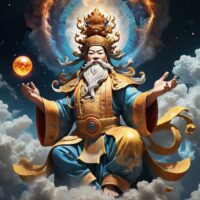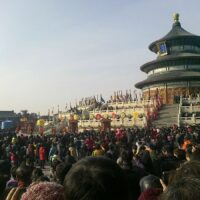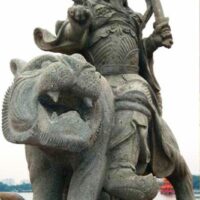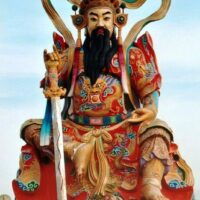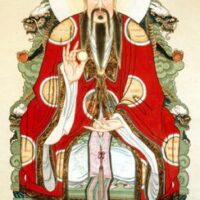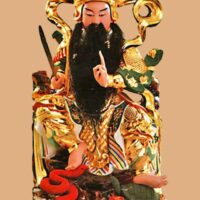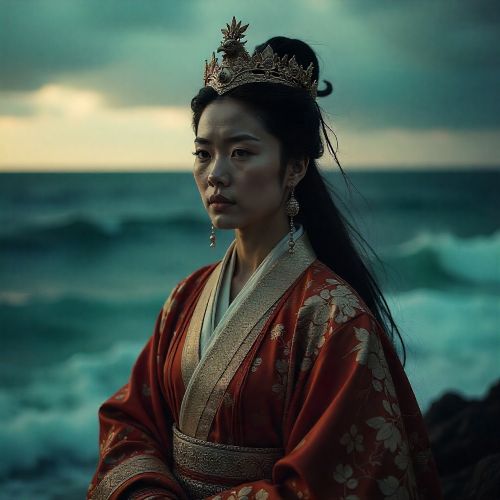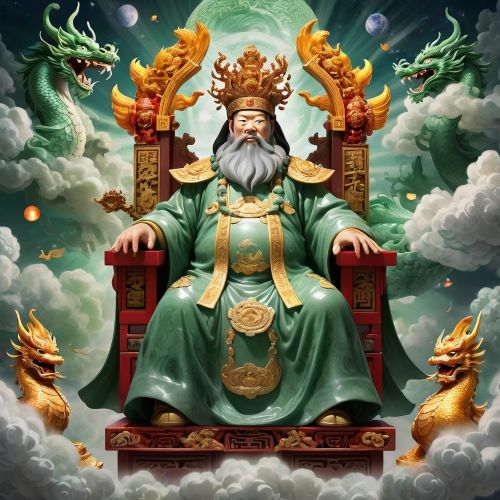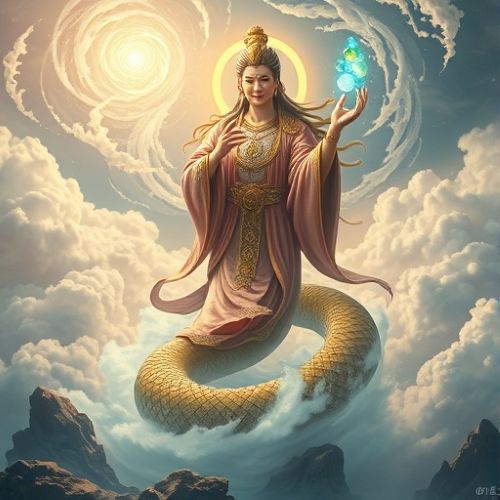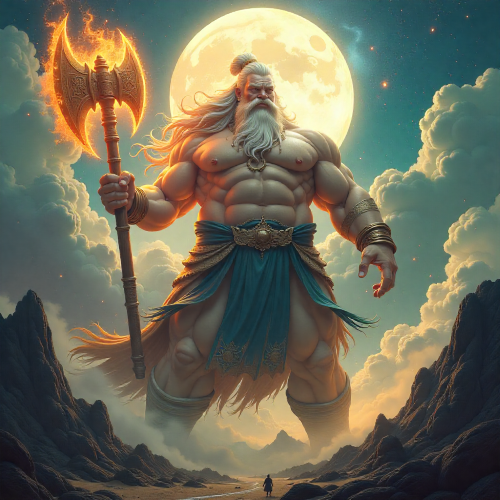Shangdi : The Supreme God of Ancient China
Listen
At a glance
| Description | |
|---|---|
| Origin | Chinese Mythology |
| Classification | Gods |
| Family Members | N/A |
| Region | China |
| Associated With | Supreme Powers |
Shangdi
Introduction
Shangdi, or Shang-Ti, was the supreme deity in ancient Chinese religion, revered as the “Lord-on-High.” He was believed to oversee human affairs, nature, and cosmic order, with influence over war, harvests, and weather. While not as widely worshiped as later deities, his presence shaped Chinese spiritual traditions.
Originating in the Shang dynasty (1600–1046 BCE), Shangdi was regarded as the divine ancestor of the ruling family, granting them legitimacy and protection. His role evolved during the Zhou dynasty (1122–256 BCE), where he became associated with “Tian” (Heaven), shifting from a personal deity to an abstract cosmic force. Despite these changes, rulers continued honoring him through elaborate sacrifices.
Beyond religion, Shangdi represented order, justice, and cosmic balance, leaving a lasting impact on Chinese philosophy and governance. His legacy continues to echo in cultural and spiritual practices today.
Physical Traits
Shangdi stands apart from many deities in world mythology due to the lack of a defined physical form in ancient texts. Unlike gods depicted with distinct features, he was understood as a transcendent force rather than a tangible being. Some later descriptions suggest he wore an imperial robe with well-groomed hair and a dark beard, but these are not universally accepted.
Rather than being visually represented, Shangdi was symbolized through rituals, divination, and celestial imagery. The Shang dynasty used various forms of the character “Di” to signify his presence, emphasizing his role as an unseen yet omnipotent ruler. This abstraction aligns with early Chinese cosmology, where divine power was perceived as an invisible force governing the universe.
Family
Shangdi’s familial connections in Chinese mythology are ambiguous and sometimes debated. Some scholars associate him with Ku or Diku, the ancestral figure of the Zi lineage that founded the Shang dynasty, implying that Shang rulers carried divine essence. However, distinctions exist—while Shangdi commanded nature spirits, Ku did not.
In the context of the Wufang Shangdi (Five Regions’ Highest Deities), Huangdi, the Yellow Deity, is often considered the common ancestor of the Chinese people, with ties to deities like Cangdi, the Green Deity, and Heidi, the Black Deity. These figures have more defined mythological relationships, such as Cangdi’s marriage to the fertility goddess Bixia.
Rather than a traditional family structure, Shangdi’s influence is reflected in his rule over celestial and natural forces. He is linked to powerful deities like Tudi Gong, the Earth God; Fengbo and Yushi, who control wind and rain; and Jiu Tian Xuan Nu, a celestial goddess of wisdom. His authority, rather than lineage, defines his place in mythology, reinforcing his role as a supreme, transcendent ruler.
Other names
Shangdi has been known by multiple names throughout Chinese history, reflecting shifts in religious and philosophical thought. One of the most common is simply “Di,” meaning “Emperor,” while “Huangtian Shangdi” translates to “Supreme Emperor of the Heavenly Realm.”
During the Zhou dynasty, Shangdi became closely associated with “Tian” (Heaven), marking a transition from a personal deity to a more abstract divine force. Other titles, such as “Heavenly Ruling Highest Deity” (皇天上帝, Huángtiān Shàngdì) and “Great Whole,” emphasize his overarching authority.
In some traditions, Shangdi is linked to the Wufang Shangdi, or Five Regions’ Highest Deities, who are collectively referred to as Wǔtiāndì (“Five Heavenly Deities”) or Tiānhuáng Dàdì (“Supreme God of Heaven”). These variations highlight the evolving perception of Shangdi as both a singular supreme ruler and part of a broader celestial hierarchy.
Powers and Abilities
Shangdi’s authority extended across the cosmos, governing the balance between Heaven, Earth, and humanity. As the supreme force behind fate and morality, he ensured the proper order of the universe and influenced the rise and fall of dynasties.
Rulers, particularly during the Shang and Zhou dynasties, sought Shangdi’s favor through elaborate rituals, believing their legitimacy stemmed from his approval. His influence over natural forces made him a key figure in agricultural rites, as communities depended on his will for favorable weather and abundant harvests.
Shangdi also held sway over warfare, invoked for victory in battles deemed just. Some traditions suggest he could summon divine forces to intervene in human conflicts. Though too transcendent for direct worship by commoners, his presence was felt through ancestral spirits and intermediaries who carried out his will.
Modern Day Influence
Shangdi’s legacy endures in various aspects of Chinese culture, philosophy, and religious practices, even though direct worship has declined. His role as the supreme deity has influenced Confucian, Daoist, and folk religious traditions, shaping ideas of cosmic order, morality, and divine authority.
In Confucianism, Shangdi’s concept evolved into Tian (Heaven), reinforcing the principles of justice and virtue that remain central to Chinese thought. Daoism, while more focused on balance and the Dao, retains celestial figures reminiscent of Shangdi’s role in overseeing the natural and spiritual worlds.
Chinese folk religion continues to honor the Wufang Shangdi, with temples and shrines dedicated to these regional deities. Elements of ancient Shangdi worship also persist in modern rituals, such as ancestral veneration and prayers for prosperity.
Beyond China, scholars examining comparative mythology often reference Shangdi when studying early monotheistic concepts. His name is even used in modern translations of religious texts to represent the supreme deity in other faiths, highlighting his lasting influence on theological discourse.
Related Images
Source
Encyclopaedia Britannica. (n.d.). Shangdi. Retrieved April 27, 2025, from https://www.britannica.com/topic/Shangdi
China – Asia for Educators – Columbia University. (n.d.). The concept of “Tian” (Heaven) and the “Shangdi” deity. Retrieved April 27, 2025, from https://afe.easia.columbia.edu/main_pop/kpct/kp_4000bce-1000ce.htm afe.easia.columbia.edu
Study.com. (n.d.). Shang Ti (Shangdi) – God of China: history & religion. Retrieved April 27, 2025, from https://study.com/academy/lesson/shang-ti-god-china-history-religion-shangdi.html study.com
Mythopedia. (2022, December 1). Wufang Shangdi (五方上帝) – The Five August Emperors. Retrieved from https://mythopedia.com/topics/wufang-shangdi/
Lewis, M. E. (2007). The early Chinese empires: Qin and Han. Harvard University Press.
Loewe, M. (1999). The Cambridge history of ancient China: From the origins of civilization to 221 B.C. Cambridge University Press.
Creel, H. G. (1937). The birth of China: A study of the formative period of Chinese civilization. Reynal & Hitchcock.
Granet, M. (1975). Religion of the Chinese people. Harper & Row.
Kohn, L. (2001). Daoism and Chinese culture. Three Pines Press.
Frequently Asked Questions
Who is Shangdi in Chinese religion?
Shangdi is the Supreme God in early Chinese belief, revered as the ruler of heaven, destiny, and the natural order of the world.
What does the name Shangdi mean?
The name translates to “Above Emperor” or “Highest Deity,” emphasizing divine authority over all earthly and heavenly rulers.
Is Shangdi part of Taoism or Chinese folk religion?
Shangdi predates both Taoism and organized folk religion, appearing in ancient texts like the oracle bones of the Shang dynasty. Later, some traditions associated Shangdi with the Jade Emperor.
What role does Shangdi play in Chinese rituals?
He was worshipped by emperors through state rituals, especially the Heaven Sacrifice at the Temple of Heaven, to ensure prosperity and cosmic harmony.
How is Shangdi different from Tian?
Shangdi is often viewed as a personal ruling god, while Tian represents the broader concept of Heaven as a moral and cosmic force. In later belief, the two ideas sometimes merged.


